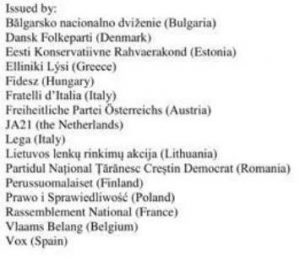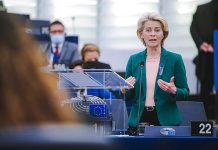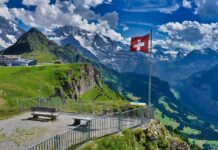On Friday, 16 political parties from both the European Conservatives and Reformists (ECR) and the Identity and Democracy (ID) groups in the European Parliament agreed a so-called “Joint Declaration on the Future of Europe”, setting out their common vision for the EU.
Joint Declaration on the Future of Europe: a manifesto for the "freedom of nations".
The full text signed by various political parties of the European Union against the federalist drift of the Brussels elite: https://t.co/26n3av5J9e— Counting Stars 🇪🇸 (@ElentirENG) July 2, 2021
The alliance brings together eurosceptics like Hungarian PM Viktor Orbán, who recently left the European People’s Party (EPP), French opposition figure Marine Le Pen, the leader of Italian governing party Lega, Matteo Salvini, and Jarosław Kaczyński, the leader of Poland’s governing Law and Justice party. They pledge to support “a reformed [European] Union”.
In particular, they note:
“The use of political structures and the law to create a European superstate and new social structures is a manifestation of the dangerous and invasive social engineering known from the past , which must provoke legitimate resistance”.
They demand something akin to a “European Subsidiarity Court”, something which is also related to the dispute over the primacy of EU law:
“It is necessary to create, in addition to the existing principle of conferral, a set of inviolable competences of the EU’s member states, and an appropriate mechanism for their protection with the participation of national constitutional courts or equivalent bodies”
They also reject proposals to scrap more national vetoes, without however demanding to restore veto powers:
“We believe that consensus should remain the basic means of reaching a common position in the Union. Recent attempts to circumvent this procedure or ideas of its abolition threaten to exclude some countries from influence on decision-making and to transform the Union into a special form of oligarchy.”
The members of the alliance

Of the members of Identity and Democracy (ID) group, the only ones missing are the German “Alternative for Germany” (AfD), Geert Wilders’ Dutch “Party for Freedom” (PVV) and the Czech “Freedom and Direct Democracy” party – led by Tomio Okamura, a politician of Czech-Japanese descent who spent the first ten years of his life in Japan, something which is not very common for anti- migration politicians.
Whether these three are considered too extreme is not clear. At least, there is no call to leave the EU. This was criticized by Florian Philippot, who leads a party that split off from Le Pen’s party, as he rubbished the idea the EU could ever be reformed, calling on French voters to refrain from believing in such pledges.
Furthermore, the rumour goes that for Orban, who’s keen not to upset German industrial groups that have major investments in Hungary, teaming up with the AfD would be a taboo.
In Italy, the alliance seems to bring rivals Matteo Salvini and Giorgia Meloni, who leads opposition party Brothers of Italy, together. Noteworthy is also how Silvio Berlusconi, came out in favour of a “big centre-right party, united”, in effect suggesting a merger between the two and his own party, Forza Italia.

Noteworthy is that several members of the “European Conservatives and Reformists” (ECR) are missing among the 16, in particular the Sweden Democrats (SD), the Czech Civic Democratic Party (ODS), the Slovak Freedom and Solidarity (SaS) party but also Dutch party JA21, which stated on twitter that it was listed among the signatories in error.
Ideologically cohesive?
Inevitably, questions are being raised about how ideologically compatible the parties that have signed the alliance are, not only when it comes to EU transfers, but also when it comes to foreign policies issues, like the relationship with Russia.
Also, I'd like to see their common position on Russia /3 pic.twitter.com/WskeX2KLeO
— Daniel Freund (@daniel_freund) July 2, 2021
This was something which was immediately seized upon by the new Polish opposition leader, Donald Tusk, who stated:
“These new friends of (PiS leader) Jaroslaw Kaczynski are different from each other but in one thing they are similar — Putin’s Russia is closer to their hearts than the European Union.”
Then, the declaration does explicitly state:
“The Atlantic Bond of the European Union and North Atlantic Treaty, as well as peace between co-operating nations are great achievements for a significant number of Europeans, giving them a sense of permanent security and creating optimal conditions for development.”
Will they also start a new group in the European Parliament?
There appears to be some disagreement on whether the plan is to form a new group, which may become the third biggest group in the EP, with 118 MEPs, bigger than Renew.
According to Nicolas Bay, the head of Le Pen’s party in the EP, the purpose was to now form a political group “in the upcoming months”. Polish PiS MEP Ryszard Legutko, has however stated that there was “no intention” to form a broader group, adding “this does not affect the configuration of the groups”, while suggesting more parties could join to support the declaration.
One of these parties may be the party led by Slovenian Prime Minister Janez Janša, whose government is currently also occupying the EU’s rotating EU Council Presidency, an ally of Orban. He has hinted that his party might leave the EPP as well.
Such a new group would be a worrying prospect for the survival of the ECR, which would be left with only five solid parties – from Belgium, the Netherlands, Sweden, the Czech Republic and Slovakia – and an insufficient number of MEPs – as 23 MEPs from at least 7 EU member states are needed.
Then, given how wary PiS is, a new group may not happen until 2024. Also, in terms of actual political firepower, an EP group should also not be exaggerated.
Last but not least, a clear majority of the listed 16 parties that have expressed support for the Eurosceptic declaration are anything but Eurosceptic when it comes to EU transfers, which typically also enables greater centralization of power in the EU. This is unfortunate, given that precisely when it comes to EU spending, the EP has actual powers to obstruct often wasteful EU transfers. Of course, to the extent that these parties have national power, they are able to block sinister EU-federalist plans, such as scrapping vetoes, but for that, a new group in the European Parliament is not needed.













